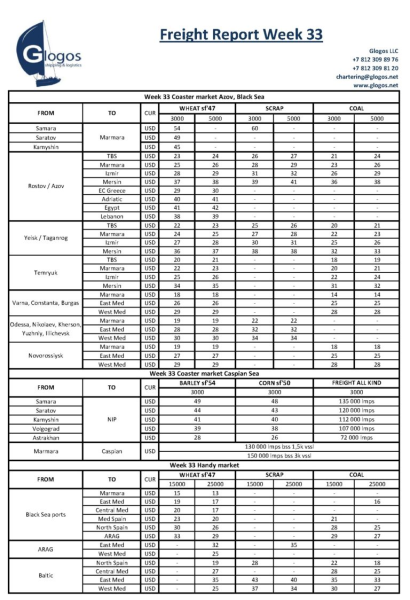As expected last time, freight market in Azov region showed a tendency to decreasing on week 33

As expected last time, freight market in Azov region showed a tendency to decreasing on week 33. The rates reached USD 25 pmt of wheat basis Rostov – Marmara. This is USD 1 less than the level of week 32. The buying power of Turkish Traders is still weak due to the lira devaluation and the imposition a new set of economic sanctions from the USA. In these circumstances, Turkish businessmen examine the terms of contacts more closely in order to avoid making deals which may turn out to be potentially disadvantageous. This factor has slowed down the process of agreeing terms for a long time and leads to a reduction in grain shipments to Turkey. After a continued increasing in grain prices in the domestic market Russian producers resumed sales at a reduced price. As nowadays, probably, there are the most favorable conditions on the market for disposal of goods. In addition, the business community made nervous all previous week by the rumors about potential introduction of export tax on wheat (canceled in 1th of July, 2019). Some Charterers suggest that particular news led to the fact that producers began to cut grain prices so as to export substantial part of the harvest before a decision to adopt a tax would be made. The business activity with countries such as Turkey and Iran was low owing to prolonged weekend in Muslim countries in celebration of Kurban – bairam. Ship Owners expect that as soon as the holidays are over, shipments will resume and freight rates will go up. Charterers, on the other hand, are confident that, due to the difficult economic situation in Turkey and the deterioration in the forecast of the harvest – 2018 in Russia, the freight market will continue to stand still. According to the estimates, a large number of vessels which has completed fulfilling of the contract obligations after holiday in Islamic countries will return to the Azov basin next week. In the context of falling prices for grain, Iranian Importers become more ambitious. As reported by Caspian Ship Owners, there is increased demand for Russian-flagged tonnage now. Probably, a considerable part of fleet from the Azov Sea will be redeployed for work to the Caspian Sea in the near future, and rates will begin to drop. Meanwhile, the freight decline in the region has stopped: there is a balance between the quantity of available fleet and the cargo supply on the market. Thus, the freight rates amounted USD 28 pmt of barley basis Astrakhan – Iran.
Post your comment